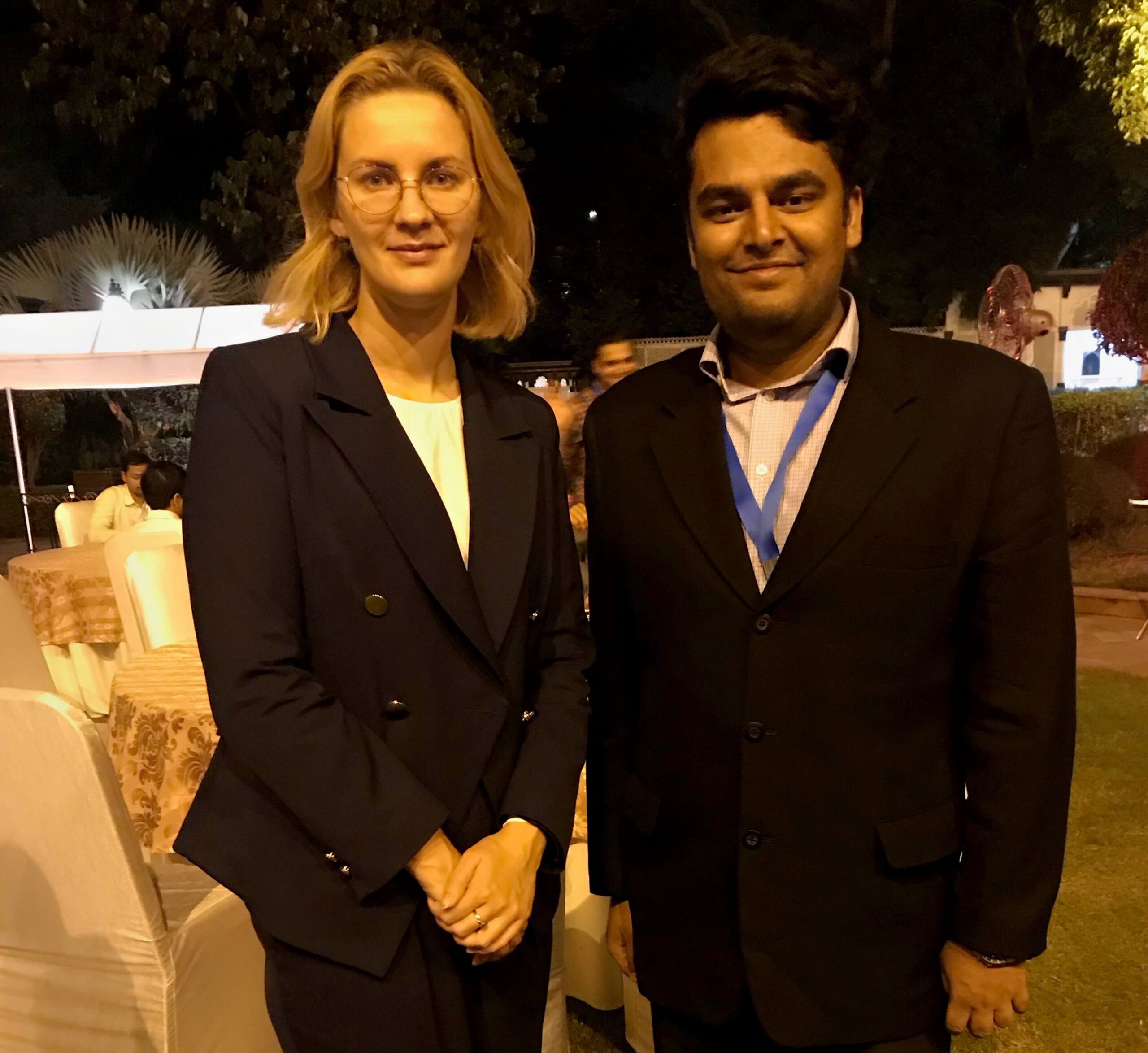In an Exclusive Interview with The Charticle, Viktoriia Romaniuk, Deputy Director at Mohyla School of Journalism and Deputy Editor at StopFake.org discussed about the organisation’s fight against fake Russian propaganda, future of Ukraine, conflict with Russia, media ethics and a lot more.
We will like to know the idea behind Stop Fake. What motivated your team to start this venture? And how has been the journey so far?
Five years ago, in 2014 during the Revolution of Dignity, when Ukraine’s ex- President Viktor Yanukovych went on the run and Russian troops started to occupy Crimea, Ukrainians experienced a massive disinformation attack from Russia. The informational space of Russia, Ukraine and Europe was flooded with deceitful messages from Russian and pro-Russian media that began to write “about the unconstitutional coup in Ukraine”, about the activities of the “junta” as well as “the legitimacy of President Yanukovych” and the role of the US and the EU in the revolution. Life in Kyiv stopped, people lived in fear and uncertainty.
The StopFake project was founded by lecturers and students of the Mohyla School of Journalism. We didn’t expect that the project will work for a long time. We hoped that after the revolution, life in Ukraine would quickly stabilize. And we will live in peace. But no we have been working for almost six years already and the problem of propaganda and disinformation is still overwhelmings.
The main objective of the StopFake team was to prove that Russian disinformation is a systematic approach of the Russian government. We have published more than three thousand articles that debunked fakes on our site – that’s quite a lot of evidence of Russian systematic lies.
StopFake team not only refuted fakes, but also created a propaganda archive and database, analyses that data and speaks about the propaganda problem at the conferences and seminars in Ukraine and abroad.
More than 40 journalists and editors throughout Europe are now working at StopFake. Information on our website is available in 13 languages, and StopFake also has 3 weekly TV shows in different languages(including English), and a weekly radio program in Russian. We also published a newspaper for the areas of eastern Ukraine where people live near the frontline.
For the sake of our readers kindly elaborate a bit regarding conflict between Russia – Ukraine, the root of it and history associated with it.
The topic of relations between Russia and Ukraine is very complicated. Yes, we have a long history of relations with Russia. This is a history of the struggle against the imperial country which destroyed Ukrainian national culture, language and identity as well as of other nations conquered. First attempt to become independent was around 100 years ago but was suppressed then with bloodshed. Only after the collapse of the Soviet Union as Ukraine regained its independence.

But Russia’s relations with Ukraine in the 90s developed in a very complicated way. They were adversely affected by the problems, that inherited from the USSR. These were issues of succession, the problem of nuclear disarmament, territorial claims, unbalanced economic cooperation based on corruption, occupation of Ukraine’s information space by Moscow, the Russian language card played in society to create social conflict. Russia continued to exert strong influence over Ukraine. At the same time, pro-European trends have developed in society. In fact, we observed the struggle between the influence of the Soviet past and the desire for a European future.
Find Us on Facebook: @thecharticle
President Viktor Yanukovych’s era in Ukraine was marked by a large-scale program of unannounced Russification. The unannounced measures on Russification were connected with the rejection of Ukrainian-language information products on state television and radio of Ukraine. It became clear that Yanukovych is closely linked to the Kremlin. Incidentally, in 2014 he fled to Russia, and now he lives in Rostov-on-Don in southern Russia.
On November 21, 2013, Mykola Azarov’s government decided to suspend the process of preparation for the signing of the Association Agreement with the EU. It happened at a time when President Viktor Yanukovych in Vienna assured reporters that Ukraine’s European integration is ongoing. The rejection of European integration has angered a large part of society. Journalists, civic activists, opposition politicians gathered on the main square of the capital – Maidan Nezalezhnosti (Independence Square). It was the beginning of the Revolution of Dignity in Ukraine. The victory of the Revolution resulted in President Yanukovych escape to Russia. But these events were contrary to Russia’s geopolitical interests.
On February 27, armed people with no insignia seized and blocked the Crimean Parliament and other administrative buildings, airports in Simferopol and Sevastopol, communications agencies, mass media, etc.
Later, a referendum on the annexation of Crimea was held under the control of these military men, who were apparently Russian special operations forces.
Immediately after the annexation of Crimea, armed actions began in the east of Ukraine – in Donetsk and Luhansk regions. The fighting was launched by Russian mercenaries, armed and funded by Russia, as well as by Russian security services and then Russian armed forces. Thirteen thousand Ukrainians were killed in the war in eastern Ukraine, including because of lies and propaganda. That’s why the main war is information war. Russian media lied about the events in Ukraine concealing its involvement in the war and occupation. The main narratives broadcast by Russia are “the junta supported by the West,” “fascist state,” “failed state,” Russia “did not carry out occupation/war.” Fake news also included topics about the Ukrainian army, volunteer battalions, internally displaced persons and refugees in Russia. Particular attention was paid to the topic of “territorial claims” from neighboring countries and the topic of “territorial disintegration of Ukraine,” fake news also included “legitimising the annexation of Crimea and the occupation of Donbas.” According to our research that were the main narratives.
One of Putin’s main narratives was a need to protect the ‘Russian-speaking population’ in Ukraine – which is another big fake. In fact, today no more than 7 percent of ethnic Russians lives in Ukraine. Although in Ukraine there are two main languages – Ukrainian and Russian. Many ethnic Ukrainians can speak Russian but that does not make them Russians and they have no problems with using Rissian language. Many soldiers who fight in eastern Ukraine against Russia also speak Russian.
That’s another important argument that this is not civil war in Ukraine as Russia insist but a just war against the Russian aggressor. There is no doubt the phenomenon of war went through crucial changes. The current war can be happening closer than it seems – and instead of states sometimes there are non- state actors involved. But with its lies, Russia is trying to cover up its crimes and strengthen its influence in Ukraine. And we have a lot of evidence for this.
How strong is the Russian propaganda inside and outside of Russia? And what is your viewpoint on Press Freedom in Russia?
Russian propaganda has an unprecedented scale. For example, The Russian federal budget draft for 2020 shows that state-owned media will receive 1.3 billion euros next year. Note which media will get the most funding.
TV News channel RT (Russia Today) will receive almost 23 billion roubles or 325 million euros, according to the draft. Pervyi Kanal will receive 92 million euros, which will cover producing, acquiring and broadcasting content. Zvezda (“The Star”) is owned by the Russia’s Ministry of Defence and is one of leading broadcasters. This successor to the official newspaper of the Soviet armed forces, Krasnaya Zvezda (“Red Star”) will receive 29 million euros. “Rossiya Segodnya” whose CEO is the EU-sanctioned Dmitry Kiselyov, includes the news agency RIA Novosti, InoSMI and the multilingual international outlet Sputnik will receive 106 million euros.
Finally, a state media outlet, which has survived Soviet name, TASS, will receive 41 million euros in support of its news agency services.
But most importantly – these media work for different target audiences – domestic (Russian), foreign – Ukrainian and international. And all these media are controlled by the Kremlin. The channels and organisations I have mentioned are major sources of Russian lies. StopFake has analysed our archive of the debunking of Russian fakes. And 90% of these fakes were broadcast by those media mentioned.
Our colleagues from the Ukrainian Crisis Media Center presented research, according to which approximately 1/3 of all news and political talk shows on Russian top-3 channels are dedicated to Ukraine and 90% of the coverage has been “negative.”
How do you see the Ukraine’s internal politics in current days? What measures are being taken by government to present a true picture of the region?
In April of this year the Presidential Election was held in Ukraine. The new President has announced that Ukraine’s pro European policy will be continued. Today it is very important to continue with pro-European democratic reforms. Also, the political elite of the country should make efforts to maintain economic and political sanctions against Russia and to maintain independence from Russian energy resources (gas, oil, nuclear fuel).
Of course, Ukraine does not have the financial capacity to invest in the information space, as Russia does. And we will not create our propaganda. But we understand that it is time to react more rigidly to aggressive disinformation, fakes and manipulation.
Find Us on Twitter: @thecharticle
Today, important laws on the protection of Ukrainian society from disinformation and the regulation of the media are being developed and discussed by the new Ukrainian authorities. Even criminal penalties for broadcasting lies and disinformation can be implemented by this new law. We understand that it is very important to prevent the official Russian media coming back into the Ukrainian media space, as they pose a threat to the national security of the country.
What else can we do? Ukraine also implements many interesting international projects of public diplomacy. Such as the “Ukraine Now” project, for example. This is a major international project that builds a positive brand of our country in the world, attracts attention to us. I am sure there will be more such projects.
In a world like today, where everything is up for sale, including media, how do you see the rise of independent non partisan media like your organisation? What is good media ethics as per you?
Analysing the Ukrainian media space, I should point out that there are no state media in our country. However, some media outlets are still owned by oligarchs who use them as a tool to promote their political and economic interests. And some of these oligarchs are pro-Russian. This creates quite an ironic situation: on one hand the state prohibits the broadcasting of Russian channels and social networks, and on another hand number of Ukrainian channels (now 4 of them) are owned by pro-Russian oligarchs and broadcast Russian disinformation. And when protests about their activities arise in society, the proprietors of these pro- Russian media begin to manipulate the concept of freedom of speech. An important role in the development of the medical space is played by independent media and media organisations. But it’s hard for them to compete with big media holdings that are funded by oligarchs. That is why today the audience has to join the fight for independent media space, learn to think critically, analyse information, boycott false publications. The advertising business must also change a lot. For example, last week Jacobs Douwe Egberts Company in Ukraine refused to advertise on one television channel owned by a pro-Russian oligarch and spread untrue information. This should become a regular practice for the advertising business that looks after its reputation.
What role do you think global community can play in ensuring peace in Ukraine?
Over the past six years, Ukraine has come through a difficult path of fighting the information and kinetic war simultaneously. We have unique experience in understanding the essence of Russia’s tactics and policies in relation to other countries. What Russia commits commits in Ukraine is not unique – such actions can be found in many other parts of the world.
During last 6 years Ukraine had a huge support of many countries and we highly appreciate it. Today Ukraine is mastering its learning curve in defending its own interests.
But, as I noted, the problem of Russian propaganda is a global threat. Which can threaten any country, so we must unite not only to help Ukraine, but to prevent the possible disaster for others.
You can now Support The Charticle by making a small contribution : https://www.instamojo.com/@thecharticle/
 The Charticle Asia's top notch digital journalism
The Charticle Asia's top notch digital journalism



